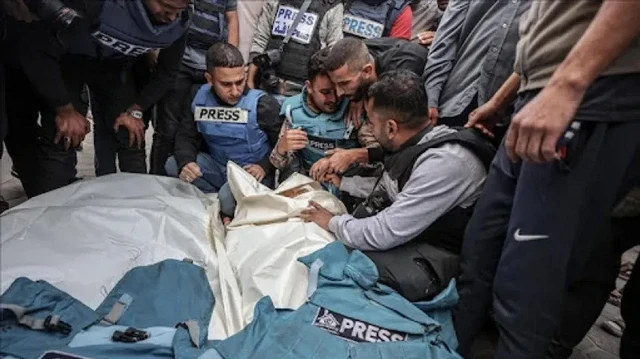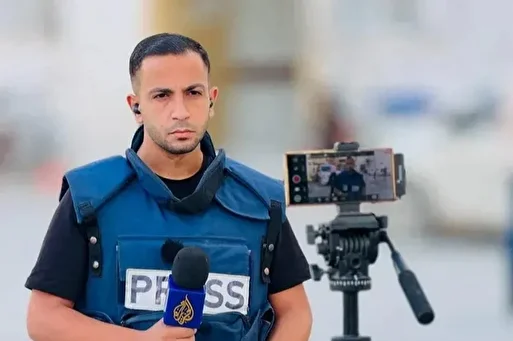
Nearly two years into the Israeli offensive, Gaza’s population continues to face severe humanitarian challenges. Large numbers of civilians have been displaced, with many losing their homes and family members. Access to basic needs such as food, electricity, clean water, and medical treatment remains critically limited. Reports indicate that the number of child amputees has reached unprecedented levels and with the recent evacuation order, palestinians are facing severe uncertainty.
Hospitals, aid convoys, and schools have all come under fire, affecting doctors, international volunteers, and teachers.Amidst all this suffering, there is an important source of information whose members risk their lives daily to give a voice to the people and expose the cruelty that is happening: Journalists.
Journalists play a huge role in providing the public with accurate information about a situation. War journalism in particular is a key factor in documenting evidence. In places where manipulation, misinformation and propaganda exist, journalism is crucial for providing solid, verifiable facts.
By the early 1980s, Palestinians in the occupied territories were actively involved in publishing. However , all Palestinian publications were subject to Israeli military censorship. Every night, editors had to submit two copies of everything they planned to print to Israeli censors. This included articles, photographs, advertisements, weather reports, and even crossword puzzles.
Anything deemed to be 'of political significance' by the Israeli censor had to be removed prior to publication. Editors who violated these terms or were accused of belonging to Palestinian political groups could be detained or deported.
Looking back in history, freedom of the press in Palestine has always been suppressed in various ways. Currently, extremely high levels of press suppression are being reported, which have resulted in the killing of many Palestinian journalists.. According to the United Nations, 242 Palestinian journalists have been killed between october 7 and 11 August 2025.
International Journalists are being prevented from entering and reporting the war, and the Israeli military has decimated Gaza’s own media community. According to the Commitee to Protect Journalists, Israel's war on Gaza is more deadly to journalists than any previous war throughout history.
“Palestinian journalists are being threatened, directly targeted and murdered by Israeli forces, and are arbitrarily detained and tortured in retaliation for their work. By silencing the press – those who document and bear witness – Israel is silencing the war,” the organisation said.
According to international law, journalists are recognized as protected civilians, and intentionally targeting them is classified as a war crime. Despite this, Israel has continued to carry out strikes that have resulted in the deaths of journalists, at times acknowledging responsibility for these incidents.

Recently, the killing of the Palestinian Journalist Anas al Sherif has sparked international outrage. The young journalist had lost his family to the war and despite that he has never stopped his mission to deliver the truth and be the voice of Gaza. He was targeted several times and survived all the attacks until Israel eventually killed him along with his crew mates documenting from Al-Shifa Hospital. He became the symbol of resistance and war journalism in Gaza providing raw footage of the cruelty happening there.
These were his last words on his will that was published after he was murdered.
Restrictions on international journalists entering Gaza, along with attacks on Palestinian journalists, have limited independent reporting from the region. Some observers note that certain media outlets do not fully report on these incidents or provide context for the risks journalists face, raising concerns about gaps or inaccuracies in coverage of the conflict.
“At the rate journalists are being killed in Gaza by the Israeli army, there will soon be no one left to keep you informed”
Ahmed Abu Aziz
Mohammed Salama
Moaz Abu Taha
Hussam al-Masri
Mariam Abu Dagga
Anas al-Sharif
Mohammed Noufal
Ibrahim Zaher
Mohammed Qreiqeh
Moamen Aliwa
Mohammad al-Khaldi
Ismail Abu Hatab
Moamen Abu AlOuf
Ahmad Qalaja
Ismail Baddah
Suleiman Hajjaj
Hassan Abu Warda
Hassan Samour
Ahmed al-Helou
Yahya Sobeih
Noureddine Abdo
Fatma Hassouna
Hilmi al-Faqaawi
Ahmed Mansour
Mohammed Mansour
Hossam Shabat
Mahmoud Islim al-Basos
Ahmed al-Shayyah
Ahmed Abu al-Rous
Mohammed al-Talmas
Saed Abu Nabhan
Omar al-Dirawi
Areej Shaheen
Hassan al-Qishawi
Ayman al-Gedi
Faisal Abu al-Qumsan
Mohammed al-Ladaa
Fadi Hassouna
Ibrahim Sheikh Ali
Mohammed al-Sharafi
Ahmed al-Louh
Mohammed al-Qrinawi
Mohammed Balousha
Iman al-Shanti
Maisara Ahmed Salah
Mamdouh Qanita
Ahmed Abu Sharia
Mahdi al-Mamluk
Ahmed Abu Skheil
Zahraa Abu Skheil
Bilal Rajab
Amr Abu Odeh
Saed Radwan
Nadia Emad al-Sayed
Haneen Baroud
Tareq AlSalhi
Mohammed al-Tanani
AlHassan Hamad
Abdul Rahman Bahr
Nour Abu Oweimer
Wafa al-Udaini
Mohammed Abed Rabbo
Hussam al-Dabbaka
Hamza Murtaja
Ibrahim Muhareb
Tamim Abu Muammar
Mohammed Issa Abu Saada
Rami al-Refee
Ismail al-Ghoul
Mohammed Abu Daqqa
Mohammed Abu Jasser
Mohamed Meshmesh
Mohamed Manhal Abu Armana
Amjad Juhjouh
Wafaa Abu Dabaan
Rizq Abu Shakian
Saadi Madoukh
Mohammed al-Sakani
Mohammed Abu Sharia
Rasheed Albably
Ola Al Dahdouh
Mahmoud Juhjouh
Bahaaddine Yassine
Mustafa Ayyad
Salem Abu Toyour
Ibrahim al-Gharbawi
Ayman al-Gharbawi
Mohammed Bassam al-Jamal
Mustafa Bahr
Mohamed Adel Abu Skheil
Saher Akram Rayan
Mohamed el Sayed Abu Skheil
Tarek El Sayed Abu Skheil
Mohamed el-Reefi
Abdul Rahman Saima
Muhammad Salama
Mohamed Yaghi
Zayd Abu Zayed
Ayman al-Rafati
Angam Ahmad Edwan
Alaa al-Hams
Yasser Mamdouh el-Fady
Nafez Abdel Jawad
Rizq al-Gharabli
Mohammed Atallah
Tariq al-Maidna
Iyad el-Ruwagh
Yazan al-Zuweidi
Mohamed Jamal Sobhi al-Thalathini
Ahmed Bdeir
Shareef Okasha
Heba al-Abadla
Abdallah Iyad Breis
Mustafa Thuraya
Hamza al-Dahdouh
Akram ElShafie
Jabr Abu Hadrous
Ahmed Khaireddine
Ahmad Jamal al-Madhoun
Mohamad al-Iff
Mohamed Azzaytouniyah
Mohamed Naser Abu Huwaidi
Mohamed Khalifeh
Adel Zorob
Abdallah Alwan
Haneen Kashtan
Assem Kamal Moussa
Samer Abu Daqqa
Ola Atallah
Duaa Jabbour
Shaima el-Gazzar
Hamada al-Yaziji
Hassan Farajallah
Abdullah Darwish
Montaser al-Sawaf
Adham Hassouna
Marwan al-Sawaf
Mostafa Bakeer
Mohamed Mouin Ayyash
Mohamed Nabil al-Zaq
Assem al-Barsh
Jamal Mohamed Haniyeh
Ayat Khadoura
Bilal Jadallah
Mossab Ashour
Sari Mansour
Mostafa al-Sawaf
Hassouneh Salim
Abdel Rahman al-Tanani
Amal Zohud
Abdelhalim Awad
Amro Salah Abu Hayah
Yacoup al-Borsh
Moussa al-Borsh
Ahmed al-Qara
Yahya Abu Manih
Mohamed Abu Hassira
Mohamad al-Bayyari
Mohammed Abu Hatab
Majd Fadl Arandas
Iyad Matar
Imad al-Wahidi
Majed Kashko
Nazmi al-Nadim
Yasser Abu Namous
Duaa Sharaf
Jamal al-Faqaawi
Saed al-Halabi
Ahmed Abu Mhadi
Tasneem Bkheet
Ibrahim Marzouq
Mohammed Imad Labad
Roshdi Sarraj
Mohammed Ali
Khalil Abu Aathra
Sameeh al-Nady
Issam Bhar
Mohammad Balousha
Abdulhadi Habib
Yousef Maher Dawas
Salam Mema
Husam Mubarak
Ahmed Shehab
Hisham Alnwajha
Mohammed Sobh
Saeed al-Taweel
Ibrahim Mohammad Lafi
Mohammad Jarghoun
Mohammed al-Salhi







